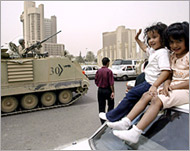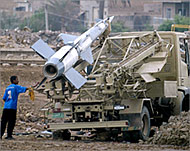Iraq rebuilding throws up many questions
US officials and international agencies have their work cut out in re-building crippled Iraq.
In rebuilding Iraq, US officials and international organisations must ask themselves, “Where do we begin?”
Airports are smashed, bridges broken, hospitals looted, the telephone system damaged, agriculture is on its knees, schools were vandalized, the electricity system is down, garbage collection has stopped, manufacturing is virtually halted — the list is endless.
|
|
|
The US-led war will add to Iraq’s |
That list leaves aside other deep underlying problems such as the need to reform the Iraqi currency, revamp the legal system, rebuild a police force and civil service, all crucial to the smooth functioning of a modern society.
On the bright side, the Iraqi oil infrastructure suffered only minimal damage in the war and has started to resume production. But the industry was severely degraded during the 24 years of deposed Iraqi leader Saddam Hussein’s rule and needs major investments.
According to one estimate, annual oil revenues dropped from $57.8 billion in 1980 to $15.7 billion before the war.
Although it sits on the world’s second largest oil reserves, Iraq under Hussein had become a poorhouse where 60 percent of the population was dependent on humanitarian food aid, partly because of economic sanctions after Iraq’s invasion
of Kuwait in 1990.
Yale University economist William Nordhaus wrote in a recent study that Iraq under Hussein “has experienced one of the most catastrophic economic declines in modern history,” with living standards falling by 90 percent in 23 years.
VAST FOREIGN DEBT
The country also has a vast foreign debt. Estimates vary from $100-$180 billion owed to other governments and hundreds of billions more claimed by companies and individuals.
“Priorities? In a situation like this everything is a priority,” said Colin Scott, who manages the World Bank’s post-conflict fund and was involved in reconstruction efforts in Bosnia and East Timor.
“From my experience, the four points of the compass are security, governance, economic and social stability. All have to be addressed. You have to do a little bit of everything and keep moving along the entire front,” he said.
US President George W. Bush insists the political goal of reconstruction is to establish a democratic Iraq.
“All Iraqis must have a voice in the new government and all citizens must have their rights protected … The nation of Iraq, with its proud heritage, abundant resources and skilled and educated people, is fully capable of moving toward democracy and living in freedom,” Bush said.
However, former National Security Council member Nancy Soderberg said there are no defined goals for physical reconstruction.
“Are you rebuilding Iraq to the point before sanctions were imposed in 1991 or are you just repairing the damage of the recent war? No one has said,” she said.
“In the end, they will probably just try to restore enough Iraqi infrastructure for the country to be self-sustaining,” Soderberg said.
How much is done depends naturally on how much money there is to spend. Estimates range from $20 billion a year to Nordhaus’ estimate of $605 billion over a decade. But with budgets stretched in the United States and all over the industrialized world, spending — and results — might end up at the low end.
BECHTEL TAKES LEAD
The US Agency for International Development has awarded the Bechtel Group of San Francisco the first major infrastructure-building job which covers repairing airports, ensuring that drinking water is available, repairing electric power plants and rebuilding roads, schools, hospitals and irrigation systems. The contract could rise to $680 million over 18 months.
 |
|
USAID granted a US company the |
Former AID administrator J. Brian Atwood said the primary goal was to get Iraq back to where it was before the war or better in the next two years. But beyond that, he said, progress would depend on Iraqis themselves building the kind of liberal political and legal framework in which economic progress could take place.
“You can throw a lot of money at waste water treatment plants, electricity, airports and roads and you can get the job done. But without Iraqi involvement and a sense of Iraqi ownership, it will all fall apart once the US occupation ends,” he said.
Two top priorities are repairing the water and sewage systems and getting Iraqi agriculture moving again. As many as five million Iraqis may be at risk from lack of access to safe water and sanitation. The situation is particularly severe in rural areas where the risks of dehydration and water-borne diseases are high.
Between 25 and 35 percent of the Iraqi population depend on agriculture, according to a recent study by the Council on Foreign Relations.
However half of Iraq’s cultivable land lies barren. Irrigation channels have fallen into disrepair, desalination plants have not been maintained and Hussein’s cronies siphoned off much of the funding intended for seeds, equipment and capital.
Aljazeera
